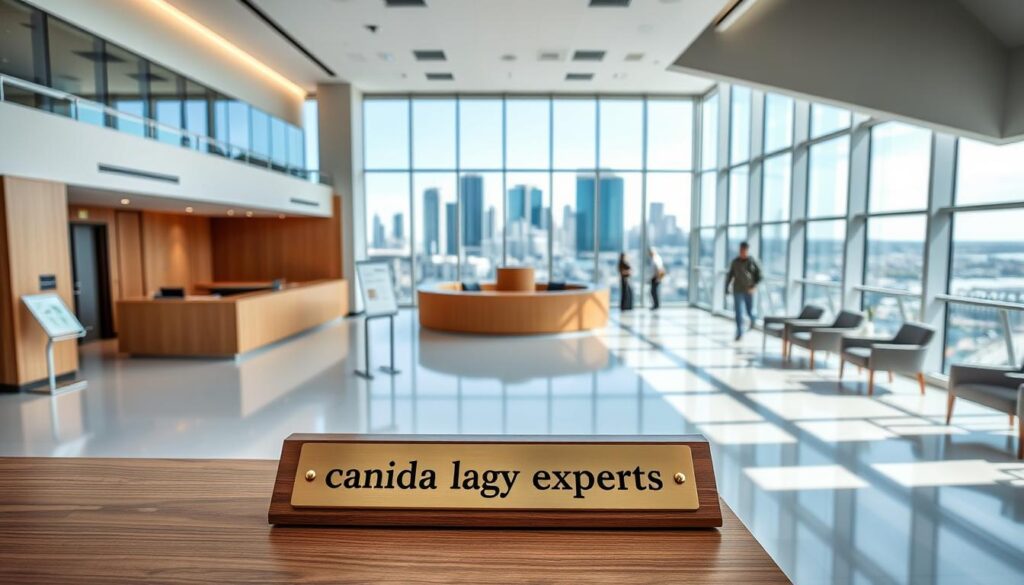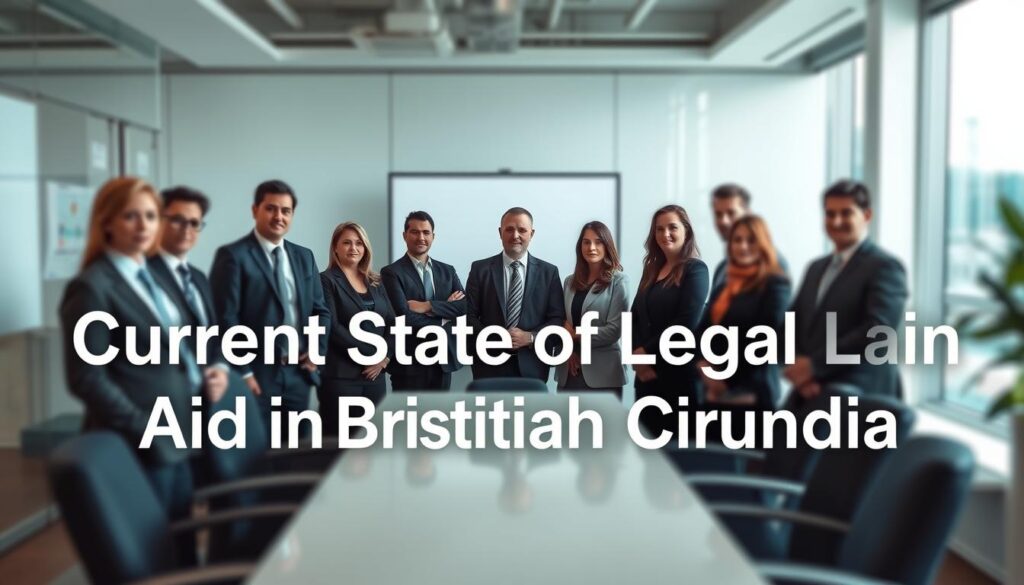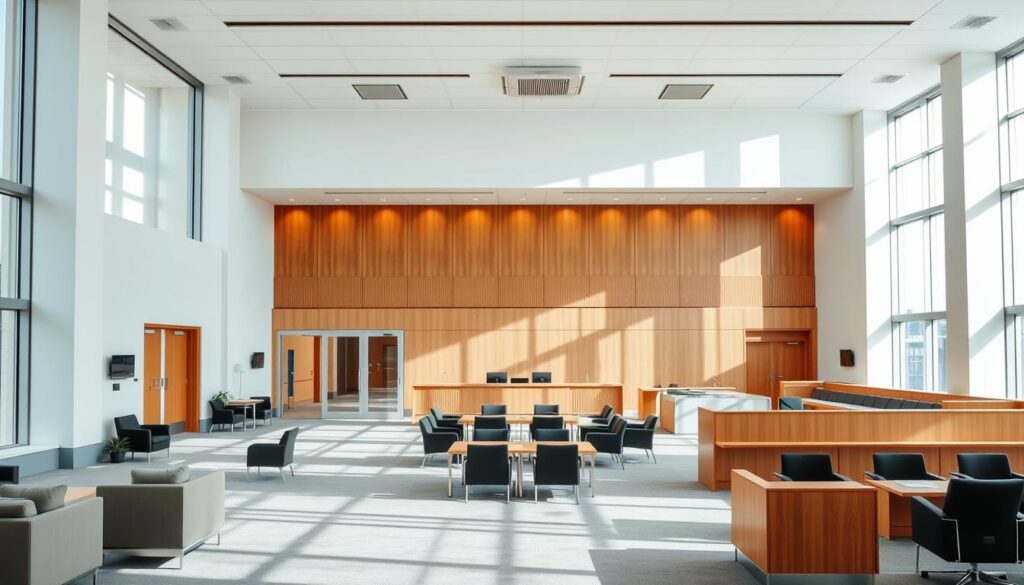Table of Contents
British Columbia is the only province in Canada without legal aid for routine family law matters. This shows a big gap in access to justice. The Canadian Bar Association, BC Branch (CBABC), has a plan to fix this. They want to improve funding for family courts and make legal help more available.
With over 8,000 legal professionals in British Columbia, the CBABC plans to make the justice system better. They suggest creating a unified family court, giving more money for legal aid, and updating court technology.
The CBABC’s Agenda for Justice 2025 also focuses on helping rural and Indigenous communities. They want to give them better internet, computers, and tech training. This will help them get better access to court services and family court resources.
By making court services more efficient and modern, the CBABC hopes to make the justice system more trusted. They want to ensure everyone in British Columbia has fair access to family court funding and resources.
CBABC’s Vision for Justice System Reform
The Canadian Bar Association, British Columbia Branch (CBABC), has a clear plan for justice system reform. They want a unified family court or a triage approach. They also aim to improve legal aid services, modernize courts, and enhance public safety and education.
This plan is based on the Agenda for Justice 2025. It emphasizes the need for a unified justice system. The CBABC aims to make the justice system fair and accessible for everyone in British Columbia.
One key part of their plan is to ensure enough court funding programs and family court system financing for legal aid. They suggest over 30 changes, including more legal aid funding and simpler court systems. Family court grants are also vital for those going through family court.
Some numbers show why change is needed: 53% of those needing legal aid in family breakdowns qualify. About 40% of family law cases in provincial court lack legal representation. There’s also a big increase in Gladue reports, showing the need to understand Indigenous experiences in court.
The CBABC’s vision is big, but it’s doable with everyone’s help. This includes the provincial government, legal experts, and other groups. Together, we can make the justice system fair and accessible for all in British Columbia.
Understanding Unified Family Court Funding Proposals
The Canadian Bar Association, British Columbia Branch (CBABC) suggests a unified family court or triage approach. This method aims to make family court more efficient and effective. Government funding for family court is key to making this happen. The unified court would handle all family law cases, making the legal process simpler for everyone.
Another important part of the plan is financial support for unified family court services. This includes setting up virtual infrastructure for routine hearings. This reduces the need for in-person visits, making the court more accessible. Unified family courts offer several benefits, such as:
- Mediation services: 90% of unified family courts offer mediation services, which can help resolve disputes without going to court.
- Family Law Information Centres (FLICs): FLICs are available on-site at all unified family courts, providing parties with access to information and resources.
- Specialized bench: Unified family courts have a specialized bench, which can provide more effective and efficient resolution of family law matters.

The unified family court funding proposals aim to create a more efficient, effective, and accessible family court system. Government funding for family court and financial support for unified family court services are essential for its success.
Current State of Legal Aid in British Columbia
Legal aid in British Columbia faces big challenges. Funding is limited, making it hard for many to get legal help. Lawyers and groups are pushing for more money to help with court costs and family law issues.
Legal aid spending in British Columbia is about $16 per person. This is less than the national average. The Canadian Bar Association says we need more money for legal aid, focusing on those who are marginalized and 2SLGBTQIA individuals.

- 49% of legal aid goes to criminal cases
- 5% is for immigration and refugee cases
- 45% is for civil cases, like family law
The CBABC suggests we should help more families with family law issues. They also want more money for legal aid for 2SLGBTQIA people. With more funding, British Columbia can make justice more accessible to everyone.
Modernizing Court Infrastructure
The Canadian Bar Association, British Columbia Branch (CBABC) suggests making court processes smoother and improving technology. They want to create a unified family court. This would make legal matters easier for everyone and cut down on the number of times people have to go to court.
The CBABC says updating court systems is key to making justice more accessible in British Columbia. They suggest increasing funding for family courts. This would help use new tech and processes. It would make it easier to have remote hearings and reduce the need for in-person visits, helping more people get legal aid.
In Canada, there are already some great steps being taken. For example, the Virtual Indigenous Justice Centre in British Columbia offers free legal help to Indigenous people. Also, the Court of King’s Bench of Alberta has an online form for French trials. These actions show how important unified family court and family court funding are for justice.

By investing in court tech and legal aid, we can make justice more efficient and easy to reach. This helps everyone involved and makes the court system work better.
Supporting Marginalized Communities Through Legal Services
The Canadian Bar Association, BC Branch, knows how vital it is to help marginalized groups through legal aid. They aim to do this as part of the agenda for justice 2025. They want to give more money to legal aid for Indigenous peoples and low-income families.
Recent numbers show that over 50% of Canadians face serious legal issues. Yet, only about 19% get formal legal advice. The Canadian Bar Association, BC Branch, wants to change this. They plan to offer legal services that are both affordable and accessible to these communities.
Some of the main steps they’re taking include:
- Increasing funding for legal aid services that cater to Indigenous peoples and low-income families
- Providing cultural competency training for legal professionals
- Creating specialized legal aid programs for marginalized communities
By helping marginalized communities through legal services, the Canadian Bar Association, BC Branch, wants to ensure everyone has access to justice. They’re committed to making a difference in British Columbia, as outlined in the agenda for justice 2025.
Technology Integration in Family Courts
Technology is key to making family courts better in British Columbia. The Canadian Bar Association, British Columbia Branch (CBABC) wants to use digital services and remote hearings. This will help everyone in British Columbia, but it will help low-income families the most.
Technology can make courts work faster and better. The pandemic made court backlogs worse. But, with remote hearing capabilities, people can join court from anywhere. This is great for low-income families who can’t afford to travel.
The CBABC suggests spending on programs to fight crime’s roots, like addiction and mental health issues. Technology also makes legal aid services easier to get. Now, people can get legal help online, from home.
- More justice for low-income families and those with disabilities
- More efficient courts
- Fewer cases waiting
- Easier access to legal aid services
Technology is essential for better justice in British Columbia. The CBABC wants to make courts more efficient and open. This will help everyone, but low-income families will benefit the most.
Public Safety and Crime Prevention Initiatives
The Canadian government has launched many efforts to improve public safety and crime prevention. They focus on helping marginalized groups and giving legal assistance to those who need it. One key effort is the National Action Plan on Combatting Auto Theft. It aims to tackle the growing problem of auto theft and address youth bullying and cyberbullying in communities.
The government also understands the special challenges faced by Indigenous populations. They have created specific plans to help with crime prevention. These plans include fighting gang activities and supporting families and individuals affected by crime. Court modernization is another important part of these efforts. It aims to make justice more accessible and lower the number of repeat offenders.
Some notable programs and services include:
- ERASE School District Mentorship Grant Program, targeting adolescents at risk of gang involvement
- Abbotsford Youth Crime Prevention Program, using a Wraparound approach to minimize risk factors for youth involved in gang activities
- ACCESS Open Minds, operating in multiple provinces to aid youth with mental health care and address crime issues related to mental disorders
These efforts show the government’s dedication to public safety and crime prevention. They focus on supporting marginalized groups and providing legal help to those in need.
Educational Outreach and Legal Awareness Programs
The Canadian Bar Association, British Columbia Branch (CBABC) wants to teach the public about legal professionals and citizens’ rights. They plan to start community education and rights awareness campaigns. This will help more people in British Columbia understand their rights and access justice.
These programs can include workshops, webinars, and online resources. They aim to help people understand the legal system and their rights better. Social programs will also support these efforts by providing funding and resources.
Some key aspects of educational outreach and legal awareness programs include:
- Community education initiatives to promote legal literacy
- Rights awareness campaigns to inform citizens of their rights and responsibilities
- Professional development resources for legal professionals to enhance their skills and knowledge
The CBABC hopes to make justice more accessible to everyone in British Columbia. They want to help those who face barriers because of their background or location. By working together, legal professionals can help create a fairer society.
| Program | Description |
|---|---|
| Community Education Initiatives | Workshops, webinars, and online resources to promote legal literacy |
| Rights Awareness Campaigns | Public awareness campaigns to inform citizens of their rights and responsibilities |
| Professional Development Resources | Training and resources for legal professionals to enhance their skills and knowledge |
Conclusion: The Future of Justice in British Columbia
The CBABC’s Agenda for Justice 2025 offers a detailed plan to change British Columbia’s justice system. It aims to make the system fairer and more accessible for everyone. The agenda tackles big issues like funding for a unified family court and the need for better legal aid.
By setting up a unified family court and boosting legal aid, the reforms aim to make the legal process smoother. They also want to help those who are most in need. The use of technology and modern court buildings will also make things easier for everyone.
The CBABC dreams of a justice system that includes everyone, empowers them, and gives them equal chances. The Agenda for Justice 2025 is a big step towards making the legal system fairer for all in British Columbia.



